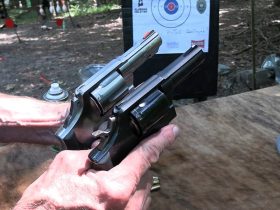In addition to the physical aspects of personal defense, shooting and tactics, the lawfully armed citizen should be just as concerned about learning the various laws regarding the use of force and the use of deadly force. Granted, quite a number of our states include a class on the law during their gun licensing classes but, given time constraints, this is often just a brief coverage of the subject. When one considers what the consequences might be, the armed citizen simply can’t learn too much about the laws regarding the use of force.
And, it can be sort of confusing in some instances. For example, some states require that a person make an effort to retreat before using deadly force, while other states have what are often called “Stand Your Ground” laws that say a person doesn’t have to retreat if they have a lawful right to be where they are. One would be smart to find out what the court’s definition of “reasonable effort to retreat” actually is. Standing your ground might not be as smart as simply trying to get away from the threat.
One should not only look at what the law says, but also what previous court interpretations of that law have been. For example, in my state the law, for years said that it was unlawful to carry a handgun on or about your person or in your saddle pockets. Only upon examination of court cases would you find out that courts had previously determined that this also included one’s automobile. Fortunately, that law was finally updated.
This being vacation season, one also has to consider carrying a gun in your car. One state might say it is lawful as long as the gun isn’t concealed, while an adjoining state might require just the opposite. And then you might drive into a state that says the gun has to be unloaded and locked in the trunk of the vehicle. In every case, telling the arresting officer about how we do it back home is probably not going to bring the desired results.
I fear that, too often, we get our legal advice from the guys at the local gun shop or down at the coffee house. While this can generally be well meaning, it is also rarely accurate. You really need to talk to an attorney who specializes in handling such cases. You can also invite such an attorney, your local prosecutor or your sheriff to speak to your gun club about the law. In an election year, politicians are generally eager to speak to a group of potential voters; you should take advantage of that.
Having a good knowledge of the law allows us to plan ahead while trying to talk down a problem or potential threat. We recognize a situation that might require force, but not deadly force, to resolve and we can also immediately recognize when that threat has gotten worse. The whole process helps us avoid responding based solely upon emotion and helps us better decide on a reasonable course of action. Knowledge becomes power and with power we are more likely to successfully overcome the threat.
Read the full article here

















Leave a Reply